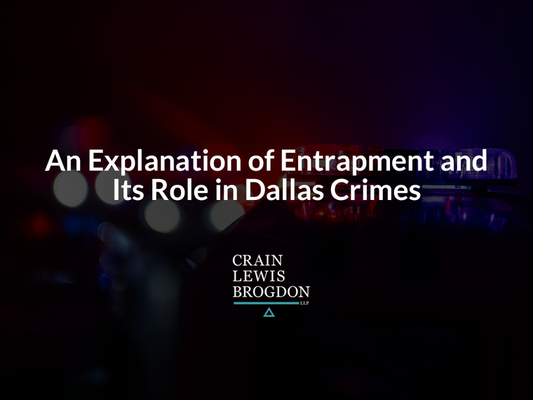
When you’re charged with a crime in Dallas, there are many reasons you may or may not have committed the crime in question. It’s possible that you didn’t know you were breaking the law or that the police officer misunderstood what you were doing. In cases of entrapment, you may not have planned to commit a crime until the police pressured you into it.
Entrapment occurs when you get charged with a crime after being coerced into the crime by a police officer. Entrapment is illegal, and you can use the entrapment defense in Dallas court to have your case dismissed in some cases. A Dallas criminal defense lawyer from Crain Lewis Brogdon, LLP can help show the judge and jury that law enforcement has wronged you.
When using the entrapment defense, you don’t have to prove your innocence; in fact, committing the crime benefits you in an entrapment case. Entrapment can be a defense if you committed a crime, if law enforcement coerced you to commit the crime, and if the police officer used persuasion or some other tactic to trigger you to commit the crime.
If you can prove to the court that you wouldn’t have committed the crime without the influence of the police, then your entrapment defense should successfully reduce or dismiss your charges.
It’s important to note that the burden of proof in an entrapment case falls on the defendant as opposed to the prosecution. In most cases, the plaintiff has to prove to the jury that the defendant is guilty; however, in an entrapment case, the defendant must prove that the plaintiff is guilty of committing an illegal action, even though the plaintiff has charged the defendant with the initial crime.
To prove whether entrapment has occurred, the Dallas court may use a subjective or an objective test. Each state chooses which test to use in their court system. In a subjective test, the jury determines whether the defendant is responsible for their actions by considering the defendant’s state of mind, their likelihood to commit a crime, and the nature of the police interference.
The state of Texas, however, uses an objective test and considers whether a typical law-abiding citizen would’ve committed the crime without police interference. An objective test is what would be applied to a Dallas entrapment case.
If you believe you committed a crime because of entrapment by the police, you may need the help of an experienced Dallas attorney to build a strong defense for court. Winning an entrapment case isn’t easy, but fighting your charges is worth it if you feel the police have wronged you.
The police shouldn’t get away with illegally coercing citizens into criminal acts, and at Crain Lewis Brogdon, LLP, we’re determined to expose this injustice. To discuss your case in greater detail with a Dallas criminal defense lawyer from our team, call 214-522-9404 to schedule a free consultation, or visit our website for more information.
If you suffered a serious personal injury, you have an important choice: finding an attorney who can not only fight for your rights but help you recover the financial compensation you truly deserve. At Crain Lewis Brogdon, LLP, we know that finding the best Dallas personal injury lawyer can seem like a huge challenge. That’s why our team provides legal guidance that truly sets us apart from the competition. We don’t just represent our clients; we work to give them a full understanding of their legal rights and options.And if you find yourself in trouble with the criminal section of the law, we can help! If you've been charged with a crime, a Dallas criminal lawyer... View full business profile here: Crain Lewis Brogdon, LLP
